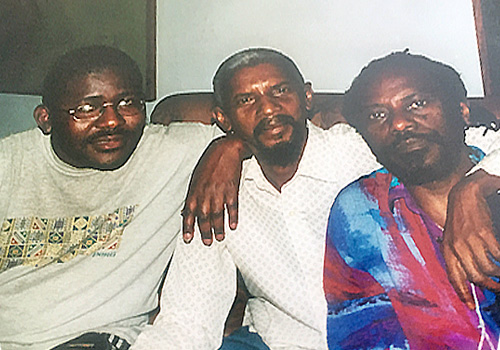Conrad James teaches what could be described as “the course with the most intriguing name.”
Written in Blood could be interpreted several ways, but the full name of the course — Written in Blood: Caribbean Readings in Conflict and Healing — gives a little more context.
The course explores writing about bloodlines, bloodshed and even bloodwork as it relates to disease, as a means to examine the complex and often violent history of the Caribbean.
It’s a dream course for Conrad James, a new associate professor with the Faculty of Arts & Science’s Centre for Comparative Literature.
“The course focuses on blood as a historical question, as a political question, but also as a methodological question — how you can use the concept of blood to make sense of history?” says James. “We also talk about bloodshed and its pivotal role in shaping the consciousness of the contemporary Caribbean.”
It’s not only the course material he loves, it’s the energy and enthusiasm of the students.
“The class is comprised of lively graduate students from different parts of the world, and they bring rich perspectives to the discussion of the material,” says James. “They also make suggestions based on their lives which illuminate the texts in ways that I had not thought about.”

While he’s fascinated with all Caribbean writing, James’ area of expertise is the literature of the Spanish Caribbean. But that goes beyond simply Cuba, the Dominican Republic and Puerto Rico.
“I also focus on Colombia, Venezuela, Costa Rica, Panama and the Caribbean coast of Mexico,” he says. “That allows for a much more expansive and far-reaching investigation of the influence of the Caribbean.”
So how did James, who was raised in Montego Bay, Jamaica, come to adore Spanish Caribbean writers and literature?
“This might not sound very academic, but when I first encountered this literature, I found it delightful, extremely sensual,” he says. “There's something specific about the Spanish Caribbean that draws you in at a very visceral level.
And that's what’s so interesting about the Caribbean — how global it is, but also its position as a conduit through which we can reinterpret the world at large.
“I was also really interested in the way Cuba was punching above its weight in global politics. I was interested in how this small island had effected a lot of change in cultural and political terms.”
That interest is still strong, as seen in his 2019 book, Filial Crisis and Erotic Politics in Black Cuban Literature.
Through his research and teaching, James recommends plenty of writers that he believes are worth reading for a true understanding of Spanish Caribbean literature.
One author who has had a profound impact on him is the Cuban novelist, essayist and musicologist Alejo Carpentier (1904-1980).
“El Reino de este mundo (The Kingdom of this World) was one of the books that was pivotal for me in my early training as a student, to understand how the Caribbean was a really important location from which to understand and reinterpret the history of the world,” he says.
Another writer he recommends is the Dominican poet, writer and diplomat, Manuel del Cabral (1907-1999). In 1973 he published a novel, El Presidente Negro (The Black President), picturing a world where the United States elects a Black leader.
James believes there are also plenty of living writers capturing a uniquely Spanish Caribbean voice, such as Cuban novelist Mayra Montero.
“She is a fierce literary arbiter for environmental justice in the Caribbean,” he says. “Her novel You, Darkness is spectacular.”
And James calls Frank Báez of the Dominican Republic “a young poet who is a must read.”
“His work is richly musical and decidedly transnational. I highly recommend the bilingual collection of poems, Last Night I Dreamt I was a DJ,” he says.
When he’s not reading or teaching such authors, James is busy with exciting research projects, such as an upcoming book called In the Path of Sun and Snow: the Transnational Geographies of Caribbean Culture.
“It traces the construction of Caribbean cultures in places you would not expect to find it,” says James, who explores pockets of Caribbean culture in areas of Spain, parts of South America such as Argentina, and as far away as Bavaria.
“I’m tracing the different patterns and trying to show that Caribbean cultures create their own geographies, and they defy the traditional expected bounds of limitations.”
James is also working on a research project that explores African theatre and performance in Cuba, which happens to house his most favourite city in all the Caribbean: Santiago de Cuba.
“It reminds me of when I was a young child growing up in Montego Bay,” says James. “It’s really interesting because Cuba has an image of being highly Spanish, and by that, I mean Hispanic. But if you go to Santiago de Cuba, it’s very African.”
According to James, after the Haitian Revolution (1791-1804), many French landowners fled Haiti for Cuba for fear of their safety and took with them large groups of Haitians.
“So you have an established Haitian culture. Then you have people from the English-speaking Caribbean, like Jamaica and Barbados, and they have their cultures there. And then you have the Spanish. So this is a tremendous mix in a small space, it's very vibrant.
“And that's what’s so interesting about the Caribbean — how global it is, but also its position as a conduit through which we can reinterpret the world at large.”

